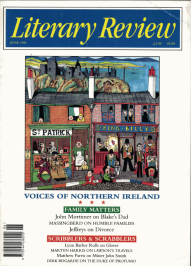Nick Hornby
Gloriously Triumphant
Paddly Clarke Ha Ha Ha
By Roddy Doyle
Seeker& Warburg 282pp £9.99
Halfway through Roddy Doyle’s brilliant new novel, the ten-year-old narrator describes a photograph of George Best in action, for Manchester United against Arsenal: he is jumping for a cross with Pat Crerand and against Frank McLintock, and as Paddy Clarke observes, manages to look graceful even in mid-air. I have this picture. I have the same book, A Pictorial History of Soccer; like Paddy Clarke, I was given it as a birthday present, and like Paddy Clarke, I wondered how the signature with which Best ended his introduction to the book had been obtained for me.
Part of Roddy Doyle’s enormous success comes from his ability to incorporate into his work the culture that millions of us know. The Commitments exploited the earnest fascination with Sixties soul that comes upon many of us in our twenties; The Van drew some of its joyousness from the heady World Cup summer of 1990. Paddy Clarke Ha Ha Ha (as the title suggests, this is Doyle’s first Rabitte-free novel) contains the references one might expect, given he age of the narrator and the year, 1968, in which the novel is set. The Virginian and Scalextric, The Fugitive and Eddie Gray, Football Monthly and Voyage to the Bottom of the Sea, the Monkees and Napoleon Solo... Paddy Clarke has received the benefits of a 1960s (masculine) classical education; David Jansen and Charles Buchan were our Virgil and Horner, and will no doubt elicit as much enthusiasm from our children when they are old enough to understand how dull we are.
Name checks, however, are only any use up to a point – thirtysomething trivia is fast becoming an overmined seam, on TV and in glossy mags, if not yet in the contemporary novel. Doyle had to find some tension from somewhere, something to stop one’s eyes skating across the familiar proper nouns to the end of the book and forgetting it at once; he has done so in spades, which is why Paddy Clarke Ha Ha Ha is so gloriously triumphant.
Doyle derives the necessary tension from three sources. Firstly, the novel is genuinely affecting, although Doyle defers the emotional punch (the precise nature of which you should discover for yourself – suffice to say that the jaunty title is turned dramatically on its head) for a dangerously long time.
Secondly, his

Sign Up to our newsletter
Receive free articles, highlights from the archive, news, details of prizes, and much more.@Lit_Review
Follow Literary Review on Twitter
Twitter Feed
How to ruin a film - a short guide by @TWHodgkinson:
Thomas W Hodgkinson - There Was No Sorcerer
Thomas W Hodgkinson: There Was No Sorcerer - Box Office Poison: Hollywood’s Story in a Century of Flops by Tim Robey
literaryreview.co.uk
How to ruin a film - a short guide by @TWHodgkinson:
Thomas W Hodgkinson - There Was No Sorcerer
Thomas W Hodgkinson: There Was No Sorcerer - Box Office Poison: Hollywood’s Story in a Century of Flops by Tim Robey
literaryreview.co.uk
Give the gift that lasts all year with a subscription to Literary Review. Save up to 35% on the cover price when you visit us at https://literaryreview.co.uk/subscribe and enter the code 'XMAS24'